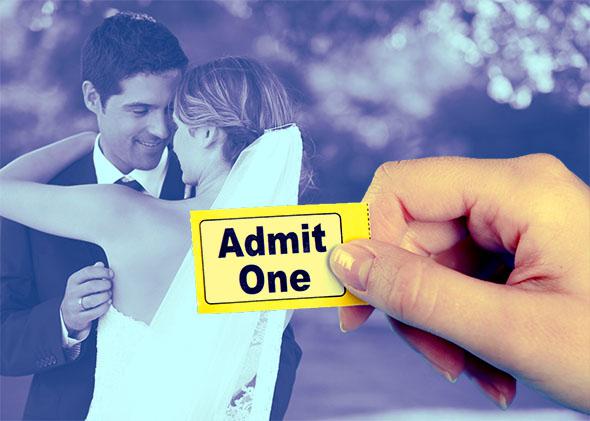As I argued last week, a rollicking party with mediocre floral arrangements is surely more memorable than a lousy one with towering orchids, and an inclusive guest list yields more entertainment value than embossed invitations with tissue inserts. But not every budgetary decision is as simple as trading peonies for carnations. What if you’re forced to decide between a bunch of +1s and an open bar? Is there a way to avoid these wedding-day conundrums?
Let’s review some basic wedding economics. A 2005 article in Mother Jones puts the average cost of an American wedding at $133 per guest, or $22,360 for a party of 168 people. Those numbers sound a little high to me—is 168 really standard?—but we’ll use them for the sake of argument. Imagine that you decided to implement a generous +1 policy, which lengthened your guest list by, say, 10 or 15 percent. According to the averages, you’d be adding $2,660 to the cost of your wedding.
That’s a lot of money for a young, house-hungry couple. But those data can be misleading. Any wedding comes with certain fixed costs: A live band, for example, is likely to cost the same amount with or without +1s. Same goes for the wedding dress, the rings, a wedding consultant, and any expense associated with the wedding party (ties, bouquets, gifts, and maybe the rehearsal dinner). Other costs, like food and drink, do indeed scale with the size of the reception. Still, the price associated with additional guests will drop, on average, as the size of your wedding increases. That is to say, the 168th and 169th guests at your wedding—i.e., your college buddy and his +1—will be significantly cheaper than the 10th and 11th guests—your Aunt Barbara and Uncle Cliff.
The marginal cost of adding +1s drops even further when you consider the value of the gifts those excess guests would provide. According to the numbers cited in the Mother Jones story, you can expect about three gifts for every five guests, at an average value of $85. So each additional guest is worth up to about $50 in merchandise from your registry. Of course your +1s aren’t going to be as generous as your grandparents, so you can expect the average value of your gifts to drop off somewhat as you invite more people. Nevertheless, all these bonus dates will be adding something to the pool of revenue.
All of which is to say we tend to overestimate the costs associated with +1s when we’re planning a wedding.
Still, extra guests do affect the bottom line, and the thought of receiving extra gifts may not provide much comfort. A gleaming pile of toasters, turkey basters, and crystal platters won’t pay the bill from the reception hall. What if there were some way to realize the value of your wedding gifts more directly? For starters, you might ask for a bit of cash from any guest who plans to bring a +1. This would be phrased delicately, of course: “I’d be happy to have her at the reception, but could you chip in $100 to cover her costs? No present necessary; we understand that being a guest at these events is expensive, too …” Even better, ask all of your guests to chip in some cash, in lieu of traditional gifts. By substituting personal checks for items off the registry, you’d cut the immediate cost of the event by 40 percent—that’s about $9,000 in total—with no sacrifice in quality. (A related idea: Bring back the traditional ” Dollar Dance ,” wherein guests pay for a dance with the bride or groom.)
Admittedly, this might get a bit awkward. By transforming putative acts of generosity into commercial transactions, you’ll pull back the veil from the injustice of a traditional wedding. Consider: When Aunt Barbara forks over $250 worth of silver napkin holders, she gets the same plate of catered food, a slice of the same lemon cake, and a seat in the same type of folding chair as the college buddy who buys you a $75 box set of DVDs from the Criterion Collection. Pay-what-you-wish gifting is unfair to your guests, and it may be of little help to you.
Here’s an alternative: Sell tickets to your wedding. Instead of asking guests to show up at your event with a check in an envelope, tell them to reserve spots ahead of time. Make it clear to everyone that your total box-office revenue will equal the cost of the wedding, plus a small honeymoon stipend. Then offer tiered pricing: Close relatives can purchase $250 tickets, with front-row ceremony seating, a spot at the head table at the reception, and a first dance. Established friends and second-order relatives might snap up $150 tickets, good for an unobstructed view and unlimited drinks. And your boho buddies can pick up standing-room twofers for $100.
I love the ticket-sales scheme for its radical transparency. No more awkward conversations about who’s invited and who’s not. No more snipes about the cost of a bridesmaid dress, and no more bellyaching over the price of the hotel. Wanna bring a +1? Buy her a ticket. Oh, you have kids? They’re eligible for reduced-rate seating at Table 4. Best of all, everyone knows that they’re chipping in for your party—a collective gift that you all can enjoy together.
